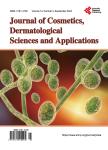Highly Efficient Rinse-Off/Leave-On Scalp Care Treatments to Reduce Moderate to Severe Dandruff
Highly Efficient Rinse-Off/Leave-On Scalp Care Treatments to Reduce Moderate to Severe Dandruff作者机构:Research & Development Beiersdorf AG Hamburg Germany.
出 版 物:《Journal of Cosmetics, Dermatological Sciences and Applications》 (化妆品、皮肤病及应用期刊(英文))
年 卷 期:2013年第3卷第1期
页 面:46-55页
学科分类:1002[医学-临床医学] 100214[医学-肿瘤学] 10[医学]
主 题:Dandruff Rinse-Off Shampoo Leave-On Tonic Anti-Mycotics Licochalcone A
摘 要:Background/Aim: Dandruff is a common scalp problem associated with flaky and inflamed skin. In this study, we investigated the efficacy of a shampoo containing piroctone olamine and climbazole and the combination of this shampoo with a scalp tonic containing piroctone olamine and licochalcone A, derived from Glycyrrhiza inflata root extract, to reduce dandruff. Study Design/Methods: After conditioning, 102 subjects (♂ 56 and 46 ♀) with moderate to very strong dandruff affection underwent a randomized half head study for 4 weeks. The volunteers’ heads were washed regularly either with a placebo or the anti-dandruff shampoo, followed by the anti-dandruff tonic application or no treatment. In a 2-week post-treatment phase, subjects only applied placebo shampoo. Every two weeks, trained experts assessed dandruff affection based on a scale of 1 to 6. At study start and after every 2 weeks, cytokine concentrations and anti-fungal activity of test products were determined in scalp wash-ups by enzyme-linked immunosorbant assays or a Malassezia colony-forming assay, respectively. Results: Results of expert grading and anti-fungal activity revealed a significant reduction in dandruff affection and Malassezia colony-forming units after treatment with the anti-dandruff shampoo or its combination with the tonic. Dandruff affection even remained reduced in the post-treatment phase when levels of Malassezia colony-forming units had returned to baseline. Cytokine analyses proved a significant decrease in pro-inflammatory dandruff markers after treatment with both anti-dandruff products. For the shampoo/tonic combination, a superior reduction of one scalp inflammatory marker was determined even after the post-treatment phase. Conclusion: Both the rinse-off shampoo as well as its combination with the leave-on tonic excellently alleviated dandruff and its associated micro-inflammation. Both treatments showed anti-fungal activity. The superior benefit, exerted by the combination, is pr



